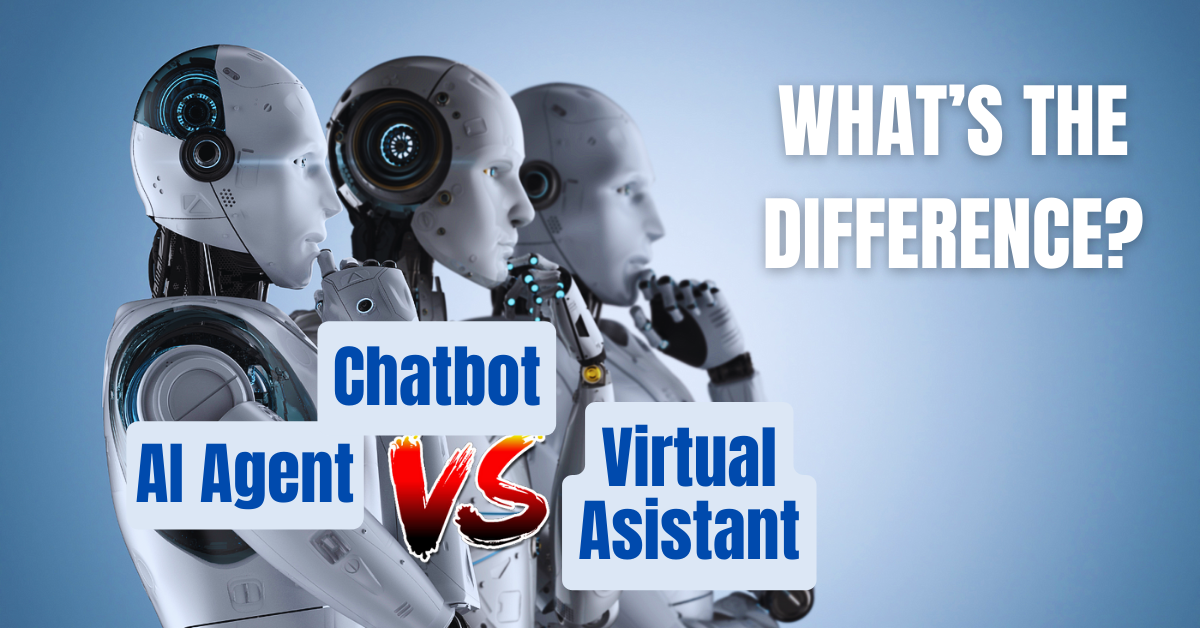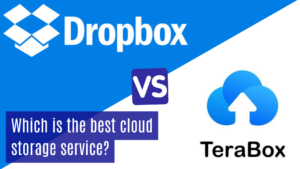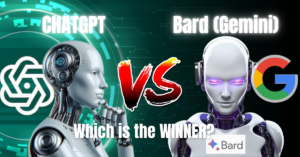Do you want to know what are the differences between AI agent vs chatbot vs virtual assistant?
Well, you have come to the right place!
You’re trying to figure out how best to automate conversations and tasks for your business. Virtual agents vs AI agents vs chatbots all promise to revolutionize customer service and sales. This article will guide you through the differences between AI agent vs chatbot vs virtual assistant, helping you understand which one can better meet your needs. Get ready!
Table of Contents
Key Takeaways
- AI agents use advanced technology to make strategic decisions, while chatbots handle simple tasks, and virtual assistants offer personalized help by understanding conversations.
- Chatbots work with pre-programmed responses, but virtual assistants and AI agents learn from interactions to improve over time using machine learning and natural language processing.
- Virtual assistants can do more because they understand context in speech or text, making them better for tasks that need a personal touch.
- Implementing both AI agent vs virtual assistant can boost sales and improve customer service by offering tailored experiences.
- As technology progresses, the role of AI agents and virtual assistants will grow in various industries, helping businesses become more efficient by handling complex processes.
Understanding AI Agents, Chatbots, and Virtual Assistants
AI agents, chatbots, and virtual assistants are software programs with different levels of intelligence and capabilities to handle routine tasks. They each have distinct advantages and limitations that impact their use in various scenarios.
Definition and Basic Functions
AI agents, virtual assistants, and chatbots help with tasks using artificial intelligence. Chatbots are great for simple jobs like answering FAQs, making handling routine stuff easy. AI agents do more by taking on strategic tasks and making decisions. Virtual assistants or intelligent virtual assistants use advanced AI to spot patterns and carry out a variety of requests.
Both chatbots and virtual assistants depend on technologies such as conversational AI, natural language processing (NLP), and machine learning to understand you. This means they get what you’re saying or typing almost like a human would. Virtual assistants go further by offering personalized talks, getting the context right most times. So, while a chatbot might help you track your order online easily, an intelligent virtual assistant could plan your day or suggest the best pizza place nearby based on your past choices.
Advantages and Limitations
After understanding their basic functions, it’s important to consider the advantages and limitations of AI agents, chatbots, and virtual assistants. Here are key points to keep in mind:
Advantages:
- AI agents provide advanced decision-making capabilities, enhancing strategic tasks.
- Virtual assistants offer highly personalized interactions and understand nuances in conversations.
- Chatbots efficiently handle routine tasks, freeing up time for more complex activities.
- Both virtual assistants and AI agents can drive sales and satisfy customer needs through advanced conversational abilities.
Limitations:
- Chatbots may have limited conversational abilities compared to virtual assistants and AI agents.
- Virtual assistants require continuous learning to adapt to varying customer demands.
- AI agents might carry a higher implementation cost due to their advanced capabilities.
- All three technologies may face challenges in understanding complex and nuanced human interactions at times.

This thorough understanding of the advantages and limitations will help you make informed decisions on which technology best suits your specific needs or business objectives.
Key Differences between AI Agents, Chatbots, and Virtual Assistants
AI Agents, Chatbots, and Virtual Assistants differ in technology, intelligence level, and use cases. Their distinctions drive their specific roles in various applications.
Technology Used
AI agents, such as virtual assistants, utilize advanced technologies like machine learning, natural language processing (NLP), and conversational AI to understand and respond to human interactions. They continuously learn from data and user inputs to improve their capabilities over time. In contrast, chatbots rely on simpler technologies for handling routine tasks efficiently, using basic rule-based algorithms and predefined responses to interact with users in a more limited manner.
Virtual assistants are equipped with sophisticated technology that enables them to recognize patterns, understand context, and deliver highly personalized conversational interactions. They leverage NLP and machine learning algorithms to comprehend nuances in human conversations and provide tailored assistance based on individual preferences. On the other hand, chatbots operate within the constraints of pre-programmed logic, limiting their ability to handle complex or strategic tasks effectively.
The technology employed by AI agents allows them to not only interpret human text or speech but also make strategic decisions based on gathered information and insights. Virtual assistants leverage cutting-edge artificial intelligence capabilities to offer advanced functionalities such as voice recognition, contextual understanding of queries, and personalized recommendations tailored towards enhancing customer experiences.
Level of Intelligence
Virtual assistants and AI agents are designed to enhance your experience by offering advanced levels of intelligence. While chatbots rely on pre-programmed responses, virtual assistants leverage machine learning and natural language processing for a more personalized and robust interaction. These intelligent features enable virtual assistants to understand complex human interactions, making them capable of providing tailored recommendations and solutions based on the nuances in conversations. In contrast, chatbots are more limited in their conversational abilities due to their reliance on predetermined scripts.
Purpose and Use Cases
AI agents, chatbots, and virtual assistants serve different purposes in various industries. Virtual customer assistants enhance online shopping experiences by providing tailored product recommendations and assisting with purchases through conversational interfaces. On the other hand, AI agents are utilized for complex decision-making processes in industries such as finance and healthcare. For instance, AI agents analyze large datasets to provide personalized investment advice or assist doctors in diagnosing patients more accurately.
These technologies have real-world applications that offer tangible benefits. In retail, virtual customer assistants can increase sales by guiding customers through the purchasing process using natural language processing (NLP). Similarly, in healthcare, AI agents support medical professionals by quickly analyzing patient data to recommend personalized treatment plans based on historical records and current conditions.
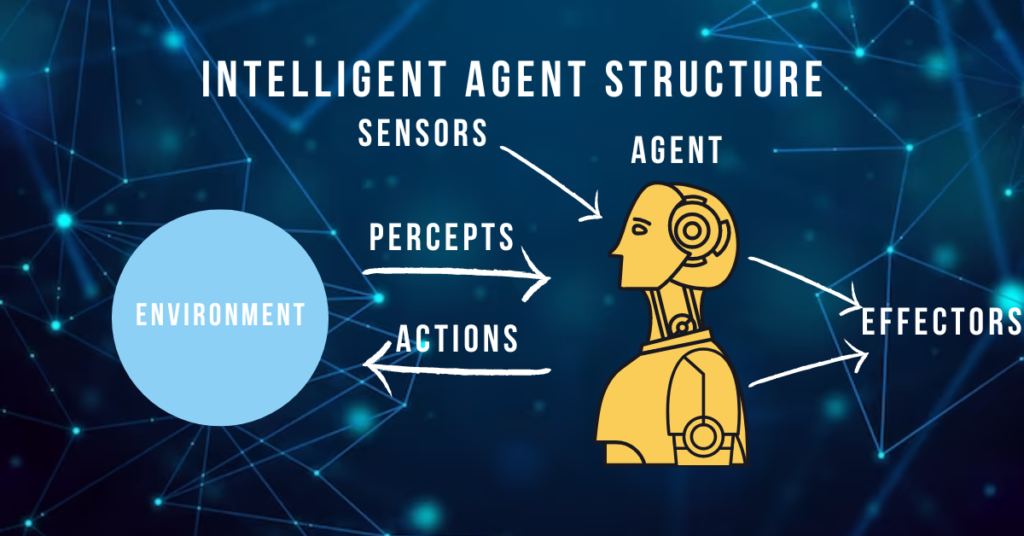
Why AI Agents and Virtual Assistants are More Advanced than Chatbots
AI Agents and Virtual Assistants embody advanced capabilities through machine learning and NLU, constantly improving their understanding. They provide enhanced experiences for both customers and employees.
Incorporating Machine Learning and NLU
Incorporating machine learning and natural language understanding (NLU) enables AI agents and virtual assistants to continually learn from interactions, improving their ability to understand and respond to complex human conversations. These technologies empower AI agents and virtual assistants with the capability to recognize patterns in data, allowing them to provide more personalized and advanced conversational interactions tailored toward individual needs.
By leveraging machine learning and NLU, these intelligent systems can comprehend nuances in language, making them adept at understanding context within conversations and delivering highly customized responses. Utilizing machine learning algorithms allows AI agents and virtual assistants to adapt their responses based on new information, enhancing their capacity for decision-making tasks while also refining their abilities over time. Natural language understanding further enhances the capabilities of these systems by enabling them to interpret human text or speech accurately. This ensures that AI agents and virtual assistants can effectively address a wide array of inquiries while efficiently grasping the intricacies of user interactions.
Continuously Learning and Understanding
AI agents are constantly learning and understanding human interactions. They use advanced technologies like machine learning and natural language processing to grasp nuances and context in conversations. This enables them to provide highly personalized and intelligent responses, making them crucial for businesses seeking advanced customer interactions. Virtual assistants, on the other hand, continuously learn from user inputs to enhance their capabilities. These AI-powered assistants are capable of understanding complex human interactions, offering tailored assistance while adapting to varying needs efficiently. In summary, AI agents and virtual assistants utilize cutting-edge technologies to adapt, evolve, and understand human interactions efficiently.
Advanced Capabilities for Customer and Employee Experience
AI agents and virtual assistants possess advanced capabilities to provide exceptional experiences for both customers and employees. For instance, these intelligent platforms can offer personalized interactions by understanding the nuances and context of conversations. They are also equipped with machine learning and natural language processing technologies, enabling them to comprehend human text or speech. Furthermore, AI agents and virtual assistants are capable of handling a broad range of tasks, from addressing complex customer inquiries to assisting with strategic decision-making processes within businesses.
Employing AI agents and virtual assistants can revolutionize the way businesses interact with their customers and streamline internal operations. These advanced systems have the potential to deliver tailored experiences that cater to individual needs while also enhancing workforce productivity through efficient support mechanisms. Implementing these technologies empowers organizations to achieve greater customer satisfaction levels while improving overall operational efficiency.
Moving forward in our discussion, let’s explore the future outlook and potential applications for AI agents and virtual assistants in more detail.

Future Outlook and Applications for AI Agents and Virtual Assistants
The future for AI agents and virtual assistants holds exciting potential across various industries, revolutionizing customer service, healthcare, finance, and more. To explore the endless possibilities and applications of these advanced technologies, delve further into our blog.
Potential for Further Development and Integration
AI agents and virtual assistants hold immense potential for further development and integration. As technology advances, these intelligent systems will continue to become more sophisticated and capable of handling complex tasks.
Businesses are increasingly integrating AI agents and virtual assistants into their operations to enhance customer service, streamline processes, and improve decision-making. The continuous advancement in machine learning and natural language processing will drive the evolution of AI agents and virtual assistants, making them even more valuable tools in various industries.
Furthermore, the integration of AI agents with other technologies such as data analytics and internet-of-things (IoT) devices opens up new possibilities for enhancing productivity and efficiency. As these advanced capabilities evolve, the use cases for AI agents and virtual assistants expand across diverse sectors including healthcare, finance, retail, manufacturing among others – redefining human-computer interaction on a broader scale.
In conclusion, the future for AI agents and virtual assistants is promising; their seamless integration into daily business operations will bring about a transformational impact by enabling smarter decision-making processes while augmenting overall user experience.
Impact on Industries and Businesses
AI agents and virtual assistants have revolutionized industries and businesses by providing advanced customer interactions. These intelligent systems deliver personalized assistance, enhancing customer satisfaction and driving sales.
For example, AI virtual assistants are used in the banking sector to guide customers through complex financial transactions, meeting their specific needs with precision. In the healthcare industry, virtual assistants assist doctors in managing patient data and scheduling appointments efficiently, improving overall productivity by 30%. Furthermore, these advanced technologies streamline operations in various sectors such as e-commerce and telecommunications by handling diverse tasks like order processing and customer inquiries without human intervention.
In addition to enhancing customer experience, AI agents enable businesses to make data-driven decisions promptly. They provide valuable insights from large volumes of unstructured data for strategic planning purposes. This empowers organizations to adapt quickly to market trends while also reducing operational costs significantly.
Virtual assistants alleviate repetitive tasks within enterprises, allowing employees to focus on more complex responsibilities leading to a 40% increase in overall productivity across various business functions such as marketing and human resources. These technological advancements not only cater effectively to consumer needs but also support businesses in achieving operational excellence while staying ahead of the competition.
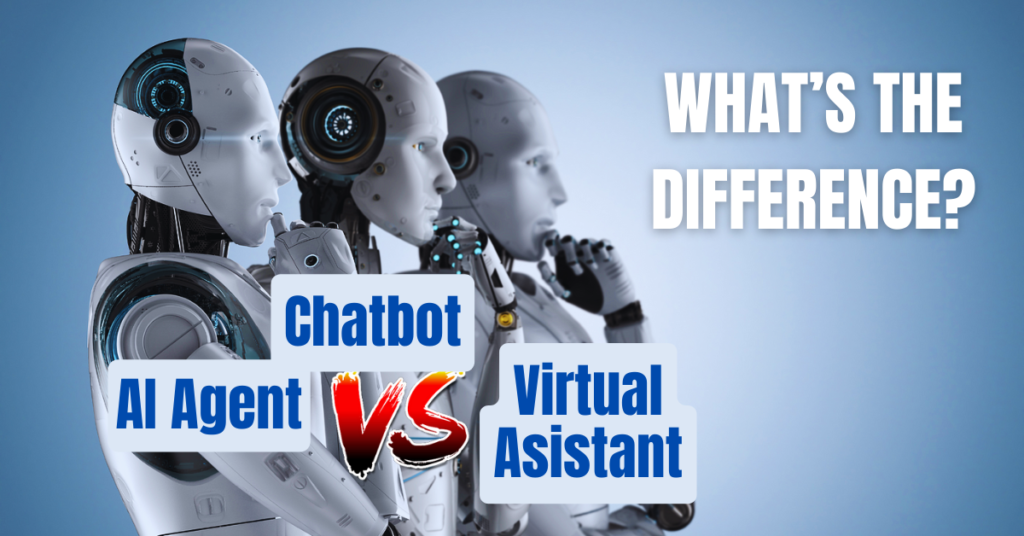
Conclusion
Now that you’ve grasped the differences between AI agents, chatbots, and virtual assistants, you can appreciate their unique roles. AI agents employ advanced technology for strategic decision-making, while chatbots excel at routine tasks. Virtual assistants bridge the gap with personalized interactions and understanding nuanced conversations. As businesses navigate ever-evolving customer needs, these distinctions will guide your choices for enhanced human-computer interactions.
FAQs
1. What’s the difference between an AI agent, a chatbot, and a virtual assistant?
An AI agent is an automated assistant that uses decision-making skills for complex tasks. A chatbot is a conversational agent that automates simple responses. A virtual assistant, like a personal or voice assistant, combines both features to enhance human-computer interaction.
2. How does automation differ in AI agents and chatbots?
AI agents use advanced automation to make decisions based on data inputs while chatbots automate routine conversations with predefined scripts.
3. Can I replace my personal assistant with an intelligent personal assistant?
Yes, an intelligent personal assistant can perform many tasks of a human personal assistant but also has added benefits of 24/7 availability and instant response times.
4. Is there any advantage in using voice assistants over other types of automated assistants?
Voice assistants offer hands-free operation which makes them ideal for users who are multitasking or have accessibility needs.


